Why do cinemas hate long movies?
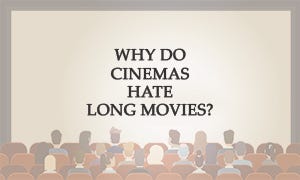
Last week, I was chatting with a cinema owner who was angrily complaining about Martin Scorsese's new movie, The Irishman.
The movie has proved controversial on a number of fronts:
It has a very short 'release window', thanks to it being entirely funded by Netflix. This means that it will available to stream only 19 days after it first appeared in cinemas. This has caused much consternation in the exhibition sector, leading to major chains refusing to screen it.
Scorsese has made some comments about his dislike for Marvel movies, referring to them as "not cinema" and describing them as "theme parks".
It is a very long movie, coming in at three and a half hours. This means that it is longer than 99.8% of movies released in cinemas over the past twenty years (more on that here).
The person who was complaining about the movie wasn't affronted by the first or the second of these controversies (beyond pointing out that theme parks are often funded by actual movie studios... unlike The Irishman!). In fact, their animus was focused on the running time.
Long movies are a problem for cinemas. Most people assume that extremely long movies mean that cinemas have to programme fewer screenings each day. This can be the case but it isn't the biggest problem long movies cause.
To understand why cinema owners hate long movies, we need to look at screening times from the point of view of the cinema.
How cinema screening times are set
The cinema week starts on Friday and ends on Thursday. Cinema times for any given week are usually decided on the previous Monday, based on the box office takings of the weekend. This is why it's typically impossible to book cinema tickets more than a week in advance. The exception to this would be special screenings (i.e. event cinema, etc) and highly-anticipated movies (i.e. tickets for Star Wars 9 went on sale a few weeks ago, despite having a mid-December release date).
This system allows programmers enough flexibility to allocate more screenings to movies which sold well and to drop poorly performing films. (See the Notes at the end of this article for a little more on this).
When deciding the start times for their movies, cinema programmers will consider the behaviour of their audience. For example, the vast majority of screenings of the family film The Addams Family are before 7 pm whereas the more mature Zombieland: Double Tap favours later screenings. The data below is for all UK screenings of the two movies in October 2019.
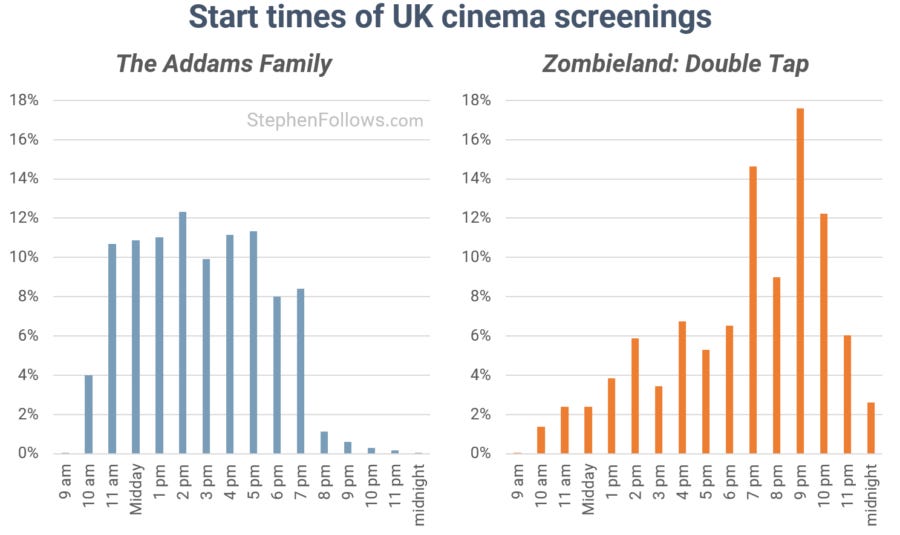
Screening times from a cinema's perspective
Below are all the screenings at my local multiplex, the Vue Westfield in Shepherds Bush. They have 20 screens and throughout the day there are 110 screenings across 25 different films. Some are screened many times (i.e. the Joker is on 16 times) whereas others are one-offs (such as 42nd Street and the 2019 League of Legends World Championship).
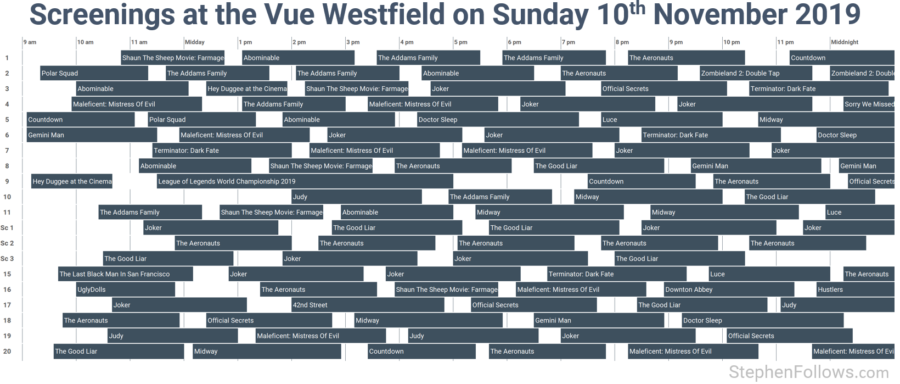
As you can see, the schedule is pretty packed, with an average of just half an hour between screenings in any given screen. During this time the first audience leaves, the staff clean up and the new audience take their seats - a pretty speedy turnaround, especially for the larger screens.
This means that cinemas are very much at the mercy of filmmakers when it comes to how many screenings they can squeeze in each day. Multiplexes such as the Vue Westfield have a little more flexibility than sites with a small number of screens. The screening times of a single-screen site are pretty much dictated by the running time. The cinema programmer can choose the start time of one of the day's screenings (let's say, 6pm) but then all of the other screening times that day are inevitable (i.e. the earliest the next screening of a three-hour movie could begin is 9:45pm, once turnaround, commercials and trailers are taken into account).
This is at the heart of why cinemas don't like long movies.
Using data on all UK cinema screenings last month, we can see that the most common start time for movies was exactly 8pm. This makes sense as it's a good time for people socialising after work.
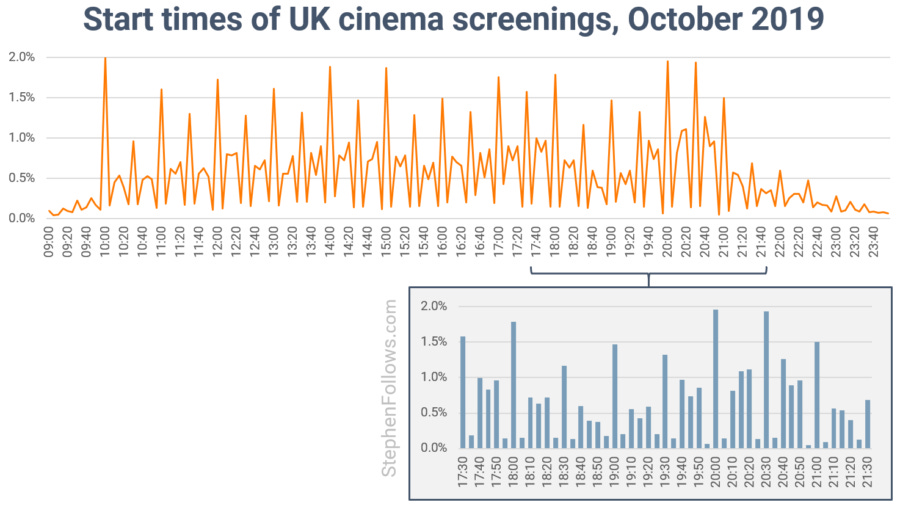
What long movies mean for cinemas
Let's look at the effect of a variety of running times on cinemas. We'll assume:
We want an 8 pm performance;
Commercials and trailers last 20 minutes;
We have a 25-minute turnaround between one screening ending and the next starting;
We open at 9 am and close by 3 am.
As you can see below, the running time of the movie has a huge effect on what's possible.
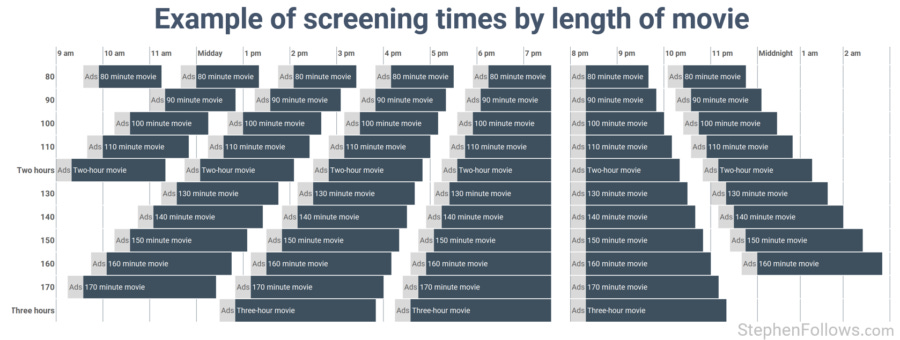
In this example, the 80-minute movie could fit in seven screenings, movies between 90 and 120 minutes have six, movies between 130 and 160 minutes have five, a 170 movie can have four and a three-hour movie is limited to just three (although in the real world, a programmer is likely to relax their 8pm rule to allow for four).
Crucially, we also suffer from the lack of a second 'primetime' screening during the week. With a fixed 8pm screening, the previous screening starts at 4:20pm - long before most people can leave work. Conversely, the 90-minute version could have a screening starting just before 6pm, one at 8pm and a third starting just after 10pm - all possible for many working people to consider.
Cinema programming is much more complex than this example, but it is a useful illustration of the two drawbacks of long movies. Movies longer than about two hours make it impossible for cinemas to have two prime-time screenings on a weekday and reduce the total number of screenings they can fit into a day.
And this is what we're seeing in the screening times for The Irishman. If I wanted to see it today (Monday 11th November 2019) here are some of the choices I am offered:
Everyman Baker Street - 11:00, 4:15, 7:00
Curzon Mayfair - 2:30, 7:00
Archlight Cinema - 2:40, 7:00
Everyman Hampstead - 10:30, 3:00, 7:30
Curzon Victoria - 11:15, 3:30, 7:45
Prince Charles Cinema - 2:15, 7:30
Curzon Soho - 12:10, 3:00, 7:20
By way of contrast, the Curzon Soho is showing Sorry We Missed You (101 minutes long) at 12:50, 4:20, 6:45 and 9:15 - note that these are two primetime slots on offer, compared with The Irishman's one.
Notes
The data for today's piece came from the public listings of cinema times by UK cinemas.
In UK cinemas, the advertised start time and running length include the commercials and trailers, whereas in US cinemas the adverts play before the start time and the trailers begin at the programme's official start time. Therefore, the schedule of a US cinema may show shorter programme running lengths and longer gaps between official screening start times. It's an interesting cultural difference and I don't know the origin of it. From a customer's point of view it is clearly much better to have the ads already finishing up as you take your seat but I can see why the advertisers and cinemas may disagree!
The point about cinemas choosing which movies to drop in the second week due to poor weekend box office is a slight simplification I made for brevity and focus. The distribution terms of Studio releases often require that the cinemas screen the film for a set number of weeks, no matter how well or poorly it performed. We can see this in the second-week numbers for the recent release of Gemini Man. The film performed very poorly in its first week but the number of cinemas showing it stayed exactly the same in week two. In these cases, sometimes cinemas can move the movie to a smaller screen, freeing up the biggest ones for more popular movies (although some studios even insist their release stays in the biggest screen in week two).


